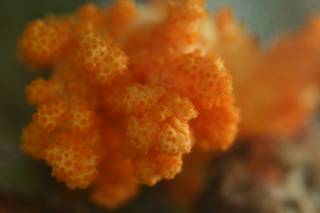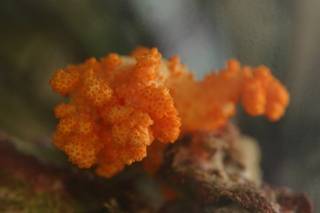|
FAQs about Soft Corals of the Family
Nephtheidae 2
Related Articles: Soft Corals of the Family Nephtheidae,
The Soft Corals of the genus
Dendronephthya, Soft Corals, Order Alcyonacea
Related FAQs: Nephtheids 1, Neptheid Identification, Nephtheid Behavior, Nephtheid Compatibility, Nephtheid Selection, Nephtheid Systems, Nephtheid Feeding, Nephtheid Disease, Nephtheid Reproduction/Propagation,
Soft Coral Propagation,
Alcyoniids, Dendronephthya, Paralcyoniids, Nidaliids, Xeniids, Soft Corals/Order
Alcyonacea
|

|
Green nepthea coral... Nephthea newbie
1/11/17
Hi. I just bought my first coral, a green nepthea, today.
<Oooohh, am hoping this is a cultured specimen.
Otherwise, not a beginner, or even moderately advanced aquarist choice>
After acclimating it and placing it in the tank, I realize I have
several general questions that I haven't been able to find the answer
to. The guy at the LFS said to stick it in a hole in the live rock,
which I did (it was not attached to anything). It fit perfectly, but now
I am wondering will it be able to grow rounder or will it be squished
because it's in a small
hole?
<IF it lives (doubtful), this genus can grow out, over such spaces...
Needs... good water quality, additions to feed zooxanthellae...>
Also, the current causes it to hit or sway against the live rock behind
it.
Will this irritate it, damage it, or cause it not to thrive because it's
polyps won't open?
<Needs moderate... non-linear (i.e. chaotic) water movement; or a
regimen of current changes (four) per day.. I STRONGLY encourage
your studying re this soft coral. In fact, I urge you to return it for
something much more likely to live. See.... WWM, the Net, books... Re.>
Thank you so much for your time and help.
Trish
<Welcome. Bob Fenner>
| Scleronepthyas Hi Bob, <Omar> Here is
the photo as promised. Not too clear I'm afraid, the camera
does not have high zoom. <It's a nice pic nonetheless> As
you can see the 2 "youngest" corals are on the rock next
to the parent, the first daughter colony is on the rock behind,
kinda hard to distinguish form the parent, but it too is now
starting to branch. The 2 younger ones are still a single branch.
<I see> any further advice would be welcome, most people I
tell just try to put me off buying a dendro, even saying that
it's impossible that I could have reproduced a sclero! its
amazing how people have no trust. same thing used to happen when I
was breeding parrots, so I guess I'm kinda used to the
pettiness of hobbyists Regards Omar <"Nothing succeeds like
success"... there have been studies, folks keeping
Dendronephthya alive for a time... Charlie Delbeek at the Waikiki
Aquarium wrote re his/their experiences... but can't remember
which of the hobby mag.s carried the popular write up re... I would
try a computer search bibliography at a large library on the topic.
Bob Fenner> |
|

|
Some questions on Chili Cactus corals 2/10/06
Hello Bob. <James> I have been reading Anthony Calfo's book
on coral propagation and your joint venture on Reef Inverts as I now
have quite and assortment of 'friends' growing from my live
rock. While I am enjoying the proliferation of sponges, horseshoe
worms, zoos, mushrooms and many other 'unknowns as of yet' I
have been tending to my growing frogspawn colonies and will soon have
to consider pruning them. This backdrop is just to let you know that
the tank is doing very well. <Good to hear/read> So, the 55
gallon tank is doing well (only set up since this summer). However, I
have had my eye on the Chili Cactus coral as a filter feeder. <Mmm,
not easily kept...> I have a relatively shady spot with good
turbulent flow near but not direct to the 260 watts of PC lighting on
the tank (everything is going to be moved to the 75 gallon Megaflow
tank since the wooden stand is more stable than the iron one that came
with the 55 within a period of time). In the meantime I have discovered
I like the chili cactus corals and from what I have read so far they
seem an easier soft coral to care for. <... are we talking
Nephthyigorgia sp., Scleronephthyas? Some folks have stated the former
are "easy"... not IMO/E> However, the specimens I have
seen at the LFS's have been... well, less than optimal and they say
the mortality rate is high. <This has been my experience... in
seeing, handling many specimens> I attribute this to the lighting
and lack of decent current in the tank they keep these particular
specimens in (from my reading not experience). What should I be looking
for with this species in particular? <Size, conformity, consistency
in color, shape... length of time on hand (a couple weeks or so
ideally)> I notice at the store they are droopy and often flopped
over however, when the lights were shut for 10-15 minutes the polyps
did extend. As I have had much success with the other corals I
'became steward of through natural growth' I feel they might
benefit in several areas of my tank. The fish in the tank are messy
feeders and I feed more than I should as not everyone gets to eat if I
don't. Fish are the Royal Gramma, Foxface, Flame Angel and Firefish
with a cleaner shrimp. May I have your thoughts on the matter please?
Thank you, James Zimmer <I would steer clear here... For your size,
type system... best to avoid. Larger systems with refugiums... I'd
try other families of cnidarians. Bob Fenner>
Re: Some questions on Chili Cactus corals - 2/11/2006
Thank you Bob. <Welcome James> Not what I was hoping to hear but
I would rather the odds were in my favor. Another issue becomes which
is it of the species you listed... this I am not sure. Almost always;
fish and corals are labeled by common name at nearly every fish store I
go to. I ask for specifics (where does the live rock come from, species
of fish coral and location they came from) but you know how it is. The
knowledge of the chili corals at this LFS were less than adequate. A
shame really they are a handsome specimen. <Gorgeous animals>
Anyway, the 75 is next to go up and I am still throwing around the
ideas of a canister filter which was a strong recommendation from a
former LFS owner/technician/system builder (he said he would show me
how to plumb and adjust it) and a Reverse Daylight Photosynthesis
refugium (beneath) in the stand. I am thinking a 30 gallon tank should
fit and standard lights on at night should be adequate without tipping
the electrical side of the equation with too much draw and outlets
used. <Some of these (Eheim is best) are very low electrical draws.
Check the amperage/wattage...> I am leaning towards the RDP so I can
have more water capacity and a safe place for pods/planktons to thrive.
<Good> I have a 24 nanocube as a replacement for the 5 gallon
tank with only sand and rock and the transported star polyps (the flame
angel finally discovered they were tasty but I saved them): POD
Palace!!! =) What size tank/system is appropriate for these chili
corals? <Bigger...> When are you going to be in this neck of the
woods again? <NJ> <Don't know... maybe my Mum-in-laws bday
later August...> Thank you. James Zimmer <Again, welcome. Bob
Fenner>
Coral (mis)ID 1/25/06 Hello WWM crew,
<Hello Rick> I have a couple of photos of an unknown coral
that I took yesterday at the LFS. Can anyone tell me
what this is & how it would need to be cared for. The LFS told
me that it was an Orange Chili coral, does this sound right??
<Wish the picture had more detail, possibly top
view. To me it looks like a cauliflower/colt coral of
the genus Cladiella which usually have shorter
fingers. James (Salty Dog)><<What? Is a
Nephtheid. Please see here: http://www.google.com/custom?q=chili+soft+coral+genus&sitesearch=wetwebmedia.com
Cheers!
Rick Waibel Jr. |
|
 
|
|
|

